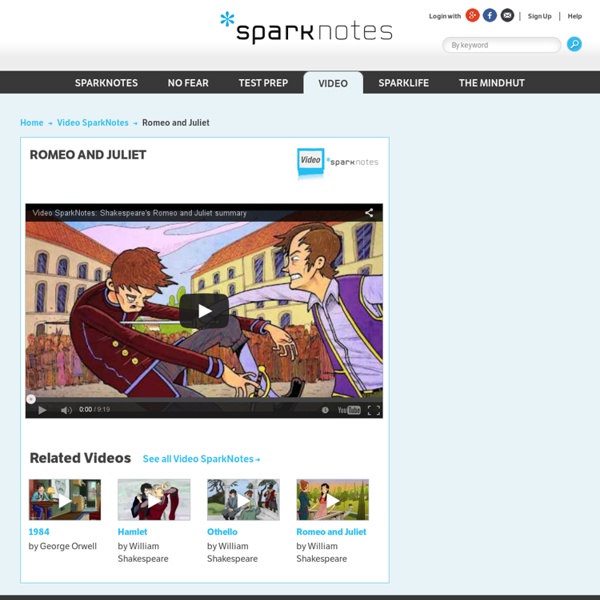



Romeo and Juliet No Fear Shakespeare puts Shakespeare's language side-by-side with a facing-page translation into modern English—the kind of English people actually speak today. Table of Contents Characters Prologue Prologue Act 1 Act 1, Scene 1 Act 1, Scene 2 Act 1, Scene 3 Act 1, Scene 4 Act 1, Scene 5 Act 2 Act 2, Prologue Act 2, Scene 1 Act 2, Scene 2 Act 2, Scene 3 Act 2, Scene 4 Act 2, Scene 5 Act 2, Scene 6 Act 3 Act 3, Scene 1 Act 3, Scene 2 Act 3, Scene 3 Act 3, Scene 4 Act 3, Scene 5 Act 4 Act 4, Scene 1 Act 4, Scene 2 Act 4, Scene 3 Act 4, Scene 4 Act 4, Scene 5 Act 5 Act 5, Scene 1 Act 5, Scene 2 Act 5, Scene 3 How to Cite No Fear Romeo and Juliet Romeo and Juliet Want more deets? We've also got a complete Online Course about Romeo and Juliet, with three weeks worth of readings and activities to make sure you know your stuff. Before young William Shakespeare wrote his play about two poetry speaking, hormone-driven teenagers who defy their families' long-standing feud and risk everything to be together, love wasn't even considered a suitable subject for a "tragedy." Not anymore. Written at the beginning of Shakespeare's career as a playwright, The Tragedy of Romeo and Juliet (c. 1595) is now considered to be the greatest love story of all time. Shakespeare adapted the storyline from Arthur Brookes' popular Tragicall History of Romeus and Juliet (1562), a long English poem based on a story that dates back to a novella by Masuccio Salernitano called "Mariotto and Giannozza" (1476). Despite its fancy pedigree, Romeo and Juliet is also considered to be one of Shakespeare's most accessible works. But is it really nothing more than a silly blockbuster?
BBC Two - Shakespeare Unlocked - Romeo and Juliet Full synopsis Romeo and Juliet was written in 1595-6 and is set in Verona, Italy, at a time when a longstanding feud between two noble families - the Montagues and the Capulets - constantly breaks out into brawling on the streets. Prince Escalus, ruler of Verona, threatens terrible punishment on anyone who takes part in further violence. Young Romeo Montague is hopelessly in love with the unattainable Rosaline and, in an attempt to cure his lovesick misery, his friends persuade him to go disguised to a party at the home of his family's sworn enemies, the Capulets. Romeo reluctantly agrees to go when he learns that Rosaline has been invited. At the party, he meets Juliet, only daughter of the Capulets, and not even knowing each other's names, they fall instantly in love. During the preparations for the party, however, Juliet's mother has told her that Count Paris, a suitable young nobleman (who is also at the party) has asked her father for permission to marry her.
William Shakespeare Biography Who Was William Shakespeare? William Shakespeare (baptized on April 26, 1564 to April 23, 1616) was an English playwright, actor and poet and is often called England’s national poet. Born in Stratford-upon-Avon, England, he was an important member of the Lord Chamberlain’s Men company of theatrical players from roughly 1594 onward. Written records give little indication of the way in which Shakespeare’s professional life molded his artistry. All that can be deduced is that, in his 20 years as a playwright, Shakespeare wrote plays that capture the complete range of human emotion and conflict. Known throughout the world, the works of William Shakespeare have been performed in countless hamlets, villages, cities and metropolises for more than 400 years. William Shakespeare: Plays Early Works: Histories and Comedies With the exception of the tragic love story Romeo and Juliet, William Shakespeare's first plays were mostly histories. Works after 1600: Tragedies and Tragicomedies Family
William Shakespeare's Romeo and Juliet by sarah murray on Prezi Romeo and Juliet by William Shakespeare te hell, all Montagues, and thee: Have at thee, coward! [They fight.] [Enter several of both Houses, who join the fray; then enter Citizens with clubs.] 1 Citizen. [Enter Capulet in his gown, and Lady Capulet.] Capulet. Lady Capulet. Capulet. [Enter Montague and his Lady Montague.] Montague. Lady Montague. [Enter Prince, with Attendants.] Prince. Absolute Shakespeare - plays, quotes, summaries, essays...
Enjoying "Macbeth" by William Shakespeare Enjoying "Macbeth", by William Shakespeare by Ed Friedlander, M.D.erf@kcumb.edu This Is NOT "Family Entertainment." Young people who know of Shakespeare from "Shakespeare Gardens" and "Beautiful Tales for Children" may be surprised by what happens in Macbeth. When we first hear of Macbeth, he has just cut an enemy open ("unseamed") from belly button ("nave") to throat ("chops"). The king shouts "Oh valiant cousin! The Real Macbeth and His Times Shakespeare got his story from Raphael Holinshed's Chronicles. I've read that Holinshed's section on Macbeth was largely derived from the work of one Hector Boece, Scotorum Historiae ("Chronicles of Scotland", 1526-7, translated from Latin into English by a John Bellenden in 1535). It is evidently not online. Here's what we think really happened with Macbeth and the other characters. In a barbaric era, population pressures made war and even the slaughter of one community by another a fact of life. The historical Mrs. Banquo and Fleance Never Existed
Shakespeare Navigators